Does Sleep Apnea Cause Weight Gain? Consulting the Science
•Wellbeing

Share
Ever found yourself wondering, does sleep apnea cause weight gain? Or conversely, is being overweight the cause of my sleep apnea? Bitta both? Well, you're not alone.
Sleep apnea is more than just an affliction that keeps your wife awake at night; it can mess with your body in ways you wouldn't expect. Let's dig into the nitty gritty of how sleep apnea and weight gain are connected and see what the science says about this complicated relationship.
Can Sleep Apnea Cause Weight Gain?
First, let's get straight into it—can sleep apnea cause weight gain? Absolutely.
Sleep apnea disrupts your sleep cycles, leading to poor-quality sleep. Sleep deprivation is a known culprit behind weight gain. According to a study published in the American Journal of Epidemiology, disrupted sleep patterns can lead to increased hunger and decreased feelings of fullness due to imbalances in your hunger hormones, leptin and ghrelin.
This hormonal havoc caused by poor sleep quality makes you more likely to overeat and less likely to feel satisfied after a meal, causing weight gain over time. So, if you're not sleeping well because of sleep apnea, your body is more likely to store fat, especially around the belly.
What Is Sleep Apnea?

Before diving further into the relationship between sleep apnea and weight gain, let's break down what sleep apnea actually is.
Basically, sleep apnea is a common sleep disorder where your breathing repeatedly stops and starts while you sleep.
Types Of Sleep Apnea
- Obstructive Sleep Apnea (OSA):
The most prevalent type is obstructive sleep apnea (OSA), which occurs when the muscles in the back of your throat relax excessively, causing a blockage in your airway. - Central Sleep Apnea (CSA):
Central sleep apnea (CSA) happens when the brain fails to send the right signals to the muscles responsible for controlling breathing.
People with sleep apnea experience interrupted breathing patterns and frequent awakenings throughout the night, often without even realising it. Common symptoms include loud snoring, choking or gasping for air during sleep, and excessive daytime fatigue despite seemingly adequate sleep.
This disrupted sleep cycle not only leaves you feeling exhausted from sleep deprivation but can also have significant impacts on your overall health and wellbeing (Source: NIH).
Risk Factors: Untreated Sleep Apnea & Weight Gain
Next up. Does untreated sleep apnea cause weight gain?
Leaving sleep apnea untreated is like letting a small leak in a boat go unattended—it only gets worse. A study in the Journal of Clinical Sleep Medicine found that untreated sleep apnea leads to increased insulin resistance.
This means your body’s ability to manage blood sugar levels goes haywire, often leading to weight gain and a higher risk of developing type 2 diabetes, cardiovascular diseases, depression and more. So, if you're struggling with both the scales and sleep apnea, it’s crucial to seek treatment.
Ignoring sleep apnea not only hampers your sleep but also sets you up for a tough battle with your weight.
How Does Sleep Apnea Cause Weight Gain?
Now, let's get into the mechanics—how does sleep apnea cause weight gain?
It's all about a vicious cycle. When sleep apnea disrupts your sleep, you wake up feeling groggy and exhausted. This lack of energy makes it harder to stick to your exercise routine and easier to reach for quick, unhealthy snacks for an energy boost. Additionally, as mentioned previously, sleep apnea impacts the production of leptin and ghrelin, the hormones that regulate hunger and fullness. According to research, these hormonal imbalances make you hungrier and less satisfied after eating, leading to increased calorie consumption and weight gain.
Essentially, poor sleep makes it much harder to maintain a healthy diet and active lifestyle.
Why Does Sleep Apnea Cause Weight Gain?
So, why does this happen? The key lies in the stress response triggered by sleep apnea. When your breathing stops and starts during sleep, your body goes into a stress mode, raising your cortisol levels.
High cortisol levels are notorious for promoting fat storage, particularly around the midsection. A study in the Obesity Journal found that individuals with higher cortisol levels tend to store more fat, particularly visceral fat, which wraps around their internal organs and is linked to various health issues.
So, sleep apnea not only makes you tired and hungry but also ramps up your body’s fat-storing processes, making weight loss even more challenging.
Does Weight Gain Cause Sleep Apnea?
But hang on a sec—does weight gain cause sleep apnea, too? You bet it does. It’s a classic case of a vicious cycle. Carrying excess weight, especially around the neck, increases the likelihood of airway obstruction during sleep, which is the primary cause of sleep apnea.
A study published in the American Journal of Respiratory and Critical Care Medicine highlights a strong link between obesity and the development of sleep apnea, noting that weight loss can significantly reduce the severity of sleep apnea symptoms.
So, the more weight you gain, the more likely you are to develop or worsen sleep apnea, creating a self-perpetuating cycle of weight gain and poor sleep.
Common Sleep Apnea Treatments
- Continuous Positive Airway Pressure (CPAP) Therapy
- Uses a machine to deliver air pressure through a mask to keep airways open during sleep.
- Proven to be highly effective in reducing sleep apnea symptoms and improving sleep quality (NIH).
- Bi-level Positive Airway Pressure (BiPAP) Therapy
- Similar to CPAP, it provides two levels of pressure: higher during inhalation and lower during exhalation.
- Beneficial for patients who struggle with standard CPAP therapy (PubMed).
- Oral Appliances
- Custom-fit devices are worn in the mouth to keep the throat open by repositioning the jaw.
- Effective for mild to moderate obstructive sleep apnea and often used as an alternative to CPAP (Cleveland Clinic).
- Positional Therapy
- Encourages patients to sleep on their side instead of their back to reduce airway blockage.
- Studies show that positional therapy can significantly decrease sleep apnea events (Sleep Medicine Reviews).
- Surgery
- Various surgical procedures, such as uvulopalatopharyngoplasty (UPPP), can remove or shrink tissue in the throat or mouth to keep airways open.
- Typically considered when other treatments fail or are not suitable (Mayo Clinic).
- Nasal Decongestants and Antihistamines
- Used to treat underlying nasal congestion that may contribute to sleep apnea symptoms.
- Can improve airflow and reduce apnea events in patients with nasal obstructions (PubMed).
- Adaptive Servo-Ventilation (ASV)
- A newer type of non-invasive ventilatory support that adjusts pressure levels based on real-time feedback to maintain regular breathing patterns.
- Effective for central sleep apnea and complex sleep apnea syndrome (High Altitude Medicine & Biology).
Sleep Apnea & Weight Gain: Breaking the Cycle

Alright, so we've established that sleep apnea and weight gain are like two mates who keep egging each other on in a downward spiral.
The good news is you can break the cycle. Treating sleep apnea can improve your sleep quality, which in turn can help regulate your hunger hormones and make weight management easier.
On the flip side, losing weight can reduce the severity of sleep apnea symptoms, creating a positive feedback loop. Adopting a healthy lifestyle with regular exercise and a balanced diet, along with medical treatments for sleep apnea, can turn things around.
How Losing Weight Alleviates Sleep Apnea
Now let’s talk about how shedding those extra kilos can help you sleep better and improve your overall health. When you lose weight, especially around your neck and upper body, it reduces the fat deposits around your airway. This means there's less chance of your airway collapsing during sleep. A study in the American Journal of Respiratory and Critical Care Medicine found that even dropping 10-15% of your body weight can seriously improve sleep apnea symptoms.
But the benefits don’t stop there. Losing weight can also lower your blood pressure, cut down cholesterol levels, and boost insulin sensitivity. All of this adds up to better heart health and less risk of conditions like hypertension and type 2 diabetes. So, it’s not just about looking good—it’s about sleeping better and feeling great overall. Get on top of your weight, and you’ll be on your way to smashing those health goals!
Here's To Improved Sleep And A Healthier You

So, does sleep apnea cause weight gain?
It certainly can. There's a clear link between sleep apnea and weight gain, with each one exacerbating the other. But don't lose heart, mate—addressing sleep apnea and focusing on a healthy lifestyle can turn things around. For more info on how to manage weight and live healthier, join the thousands of everyday Aussie blokes like you who have embraced The Man Shake program and taken charge of their health. Because you deserve to feel great, move with confidence, and, most importantly, get bloody good quality sleep!
Bibliography
- Patel, S. R., Malhotra, A., White, D. P., Gottlieb, D. J., & Hu, F. B. (2008).
- "Association between Reduced Sleep and Weight Gain in Women"
- American Journal of Epidemiology, 167(6), 664-672.
- Tasali, E., Ip, M. S. M. (2008).
- "Obstructive Sleep Apnea and Metabolic Syndrome: Alterations in Glucose Metabolism and Inflammation"
- Journal of Clinical Sleep Medicine, 4(3), 261-272.
- Spiegel, K., Tasali, E., Penev, P., & Van Cauter, E. (2004).
- Brief Communication: Sleep Curtailment in Healthy Young Men is Associated with Decreased Leptin Levels, Elevated Ghrelin Levels, and Increased Hunger and Appetite"
- Annals of Internal Medicine, 141(11), 846-850.\
- Vgontzas, A. N., Lin, H. M., Papanicolaou, D. A., et al. (2005).
- "Sleep Apnea and Visceral Fat Accumulation in Obese Subjects: The Role of IL-6 and TNF-alpha"
- Obesity Research, 13(1), 68-75.
- Young, T., Peppard, P. E., & Gottlieb, D. J. (2002).
- "Epidemiology of Obstructive Sleep Apnea: A Population Health Perspective"
- American Journal of Respiratory and Critical Care Medicine, 165(9), 1217-1239.
- Peppard, P. E., Young, T., Palta, M., Dempsey, J., Skatrud, J. (2000).
- "Longitudinal Study of Moderate Weight Change and Sleep-Disordered Breathing"
- American Journal of Respiratory and Critical Care Medicine, 161(2), 365-370.
- Redline, S., Yenokyan, G., Gottlieb, D. J., Shahar, E., O'Connor, G. T., Resnick, H. E., ... & Punjabi, N. M. (1998).
- "Obstructive Sleep Apnea-Hypopnea and Incident Stroke: The Sleep Heart Health Study"
- American Journal of Respiratory and Critical Care Medicine, 178(12), 1084-1090.






